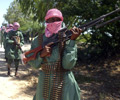
Somali political leadership met last Saturday in Djibouti, where they went ahead and rushed the process of voting in a new president, Sheikh Sharif Ahmed.
A relatively moderate Islamic cleric, 44-year-old Ahmed studied in Libya and Sudan, and worked as a geography teacher in a Mogadishu secondary school. The leader of a local Islamic sharia court, Ahmed became chairman of the Islamic Courts Union, or ICU, which drove the warlords from Mogadishu and ruled the capital for six months in 2006 before being ousted by Ethiopian troops. Ahmed’s political credibility is derived from this brief period when the ICU was able to establish a secure environment in Somalia for the first time since the county’s central government imploded in 1991.
Following the defeat of the ICU, Ahmed fled the country and became part of the opposition Alliance for the Re-Liberation of Somalia, or ARS, in Eritrea. Ahmed led the moderate faction of the ARS and has played a key role in the ongoing political talks in Djibouti, where he joined the recently enlarged Somali parliament, which elected him President.
The very fact that the parliament had to meet outside Somalia is indicative of the considerable disconnect between the volatile political reality on the ground and the U.N.-sponsored political power-sharing process in Djibouti. With the shabaab militia advancing in the south of the country, Sheikh Sharif Ahmed represents the last hope of the international community to stop the rise of the radical Islamists. But Ahmed faces several internal and external challenges: the military threat from shabaab, a bickering parliament and competing clan interests, a muddled approach from the international community, and above all Somalia’s worsening humanitarian crisis. Ahmed just might have the most difficult job in the world. As Enough has argued previously there is no substitute for the hard and time consuming work of building a new, moderate political consensus in Somalia.

